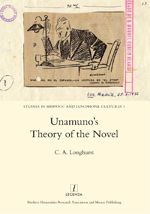Unamuno’s Theory of the Novel
C. A. Longhurst
Click cover to enlarge | Studies in Hispanic and Lusophone Cultures 1 Legenda 1 July 2014 • 240pp ISBN: 978-1-909662-14-8 (hardback) • RRP £80, $110, €95 ISBN: 978-1-315084-47-3 (Taylor & Francis ebook) ModernSpanishFictionPhilosophy Miguel de Unamuno (1864-1936) is widely regarded as Spain’s greatest and most controversial writer of the first half of the twentieth century. Professor of Greek, and later Rector, at the University of Salamanca, and a figure with a noted public profile in his day, he wrote a large number of philosophical, political and philological essays, as well as poems, plays and short stories, but it is his highly idiosyncratic novels, for which he coined the word nivola, that have attracted the greatest critical attention. Niebla (Mist, 1914) has become one of the most studied works of Spanish literature, such is the enduring fascination which it has provoked. In this study, C. A. Longhurst, a distinguished Unamuno scholar, sets out to show that behind Unamuno’s fictional experiments there lies a coherent and quasi-philosophical concept of the novelesque genre and indeed of writing itself. Ideas about freedom, identity, finality, mutuality and community are closely intertwined with ideas on writing and reading and give rise to a new and highly personal way of conceiving fiction. C. A. Longhurst is Emeritus Professor of Spanish of the University of Leeds, and was from 2004 to 2011 Visiting Professor at King's College London. Reviews:
Bibliography entry: Longhurst, C. A., Unamuno’s Theory of the Novel, Studies in Hispanic and Lusophone Cultures, 1 (Legenda, 2014) First footnote reference: 35 C. A. Longhurst, Unamuno’s Theory of the Novel, Studies in Hispanic and Lusophone Cultures, 1 (Legenda, 2014), p. 21. Subsequent footnote reference: 37 Longhurst, p. 47. (To see how these citations were worked out, follow this link.) Bibliography entry: Longhurst, C. A.. 2014. Unamuno’s Theory of the Novel, Studies in Hispanic and Lusophone Cultures, 1 (Legenda) Example citation: ‘A quotation occurring on page 21 of this work’ (Longhurst 2014: 21). Example footnote reference: 35 Longhurst 2014: 21. (To see how these citations were worked out, follow this link.)
Permanent link to this title: www.mhra.org.uk/publications/Unamunos-Theory-Novel www.mhra.org.uk/publications/shlc-1 |


